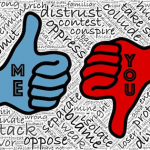
Hind Makki (Muslim blogger at Hindtrospectives): So, I wanted to talk about the light and easy topic of religious freedom, because it has been in the news a lot recently. I was shocked and — if I’m honest — somewhat amused to read recently that American White Evangelicals believe they are the most religiously persecuted faith group in the United States. This, when we are in the midst of synagogues and Jewish cemeteries getting vandalized, mosques are set on fire, and at least 4 Indian immigrants have been shot and killed by perpetrators who mistook them for Muslim (the victims were Sikh and Hindu). And that’s only in America these last few weeks! The European Court of Justice recently sanctioned workplace discrimination against Muslim women and there is the continuing persecution of Ahmadiyya in Pakistan, atheist bloggers in Bangladesh, and the blasphemy trial of a Christian governor in Indonesia.
So let’s dive right in: what is the role of interfaith communities in protecting the rights of religious minorities, and in promoting religious freedom? Does it help or hinder cases of religious persecution if “outsiders” pipe in?
Galen Broaddus (atheist blogger at Across Rivers Wide): I frankly can’t imagine there not being a role for interfaith communities and coalitions in protecting the rights of religious minorities. Interfaith connections of any kind or scale seem to me to be fundamentally about finding the intersections between our ways of seeing the world, of recognizing the fundamental humanity of all involved, and if we recognize that humanity, aren’t we obligated to do something to protect its dignity?
Andy Gill (progressive Christian blogger at Andy Gill): Outsider here, piping in, which should probably give away a portion of where I stand with the role of outsiders touching upon this topic. Similar to what Galen is saying, true persecuted minorities can greatly benefit off of outside faith communities by leveraging these allies in order to protect their religious freedom, rights, and overall humanity.
Hind: I agree. I believe governments that persecute their religious minorities can be, and often are, pressured into ceasing the persecution. Here, interfaith, diplomatic, and other outside pressure can be key.
Galen: So there are two big issues here out of all the things you mention, Hind: 1) discerning actual persecution from the appearance of it (like when religious privilege of some kind is diminished) and 2) whether or not effective pressure can be exerted from outside a religious group. The first is one I think the three of us can generally agree on, but the second is trickier, I think.
Hind: It is trickier. Sometimes pressure is best exerted from within the group — when people say literally, “not in my name.” We see a lot of this now with Christian churches offering sanctuary to undocumented immigrants across the United States. On the other hand, “outsiders” piping in can lead to an even more hard line approach, such as what is currently happening in Myanmar. Even Nobel Peace Prize Winner Aung San Suu Kyi becomes hostile when foreigners — from the UN on down — try to negotiate on behalf of the persecuted Rohingya minority there.
I worry sometimes that we (interfaith groups) shoot ourselves in the foot by adding our support to persecuted communities, because paranoid governments will then claim that Western or international support of those communities is proof that they are a fifth column. But at the same time, I believe there’s a moral imperative to speak out for justice, and on behalf of victims, even if speaking out means you are calling out your own kind.
Galen: This is a dilemma not entirely unlike dealing with trolls: You know that your attention could potentially cause a backlash, but is silence any better? I think there’s a degree to which this is a matter of having no perfect solutions.
But I do think that interfaith conversations might be a way of sparking that internal catalyst by getting people in that “in-group” to speak out among “their own kind,” as you said, and we can provide support for that.
Andy: Could the two of you expound on this, as I’m not following how supporting persecuted communities could cause backlash in these instances. But I mean, it could just be that I don’t feel that same way in that persecuted communities shoot themselves in the foot by adding support…
Galen: Part of the issue of backlash is that persecution is often strongly predicated on in-group/out-group dynamics, and that means that external pressure toward oppressive groups (like the Muslim government of Bangladesh toward atheist bloggers, in one case) will be seen as the work of interlopers. When the pressure is internal, it can still be waved off as the work of heretics or such, but it’s more difficult to ignore and doesn’t trigger the same kind of response.
Hind: It can cause a backlash when members of the majority essentially tell those of us speaking out to “butt out” of their internal affairs. And then pile on the discrimination or persecution against their minorities because of the perception that the minorities – who are usually disadvantaged in nearly every way – are somehow connected to a powerful, worldwide cabal and should therefore be treated as a fifth column. I’m using dramatic terminology, but it does happen, unfortunately.
Andy: Okay, I see now. So, it’s not the question of whether or not support should be there; it’s a matter of what type of support one should strategically enlist.
Hind: Exactly.
Galen: Right, because good intentions are not the only consideration, of course.
Hind: That’s a great point, Galen. For me, interfaith spaces have also been where I built intra-faith relationships, and learned about concepts such as Shiaphobia and the history of Ahmadiyya persecution. Being part of the majority within my own faith I was not aware of these issues and was challenged to educate myself and use my relative privilege (as a Sunni) to speak out in support of persecuted minorities.
Galen: Those relationships are, in my opinion, a great place to start. A few years back, I picked up the book In Faith and In Doubt, written by my friend (and now my Patheos boss) Dale McGowan, which is about mixed-belief relationships, particularly religious/secular pairings. One of the things he advised for such couples that actually surprised me at first is that you have to be willing to stick up for your partner, even when they aren’t around. The more I thought about it, the more obvious it was to me.
It’s a hard approach to take because it requires so much hammering away, trying to get people to see beyond the stereotypes and negative perceptions of groups that are persecuted. And there are cognitive biases working against it, like the just world fallacy, which make privileged people resistant to accepting the injustice of that persecution. (That also makes it extra galling when those same people take up the mantle of persecution for themselves!)
I should also mention that it also requires us to shout down those people who see defense of other groups as a betrayal of one’s in-group identity. That’s a toxic view that no one should tolerate.
Andy: I agree, as a self-professing evangelical I’ve seen this a ton. But I think that as we’ve seen evangelical leaders speak up and out against the orders and oppressively offensive sanctions Trump has put forth, we still yet see an overwhelming support from the congregants themselves being anti-Muslim.
Hind: That idea that speaking out means the betrayal of the in-group is really frustrating to me. I’m not that concerned about making my in-group seem enlightened and progressive; I’m concerned that all people have equal rights and equal dignity protected under the law. I believe that equality is Divinely inspired, but that’s because I’m a person of faith. The implementation of equality is a purely human endeavor and, as such, is flawed and requires constant vigilance.
Andy: And, yes, Hind, I too believe that equality is Divinely inspired. I worry as many professing atheists seem to be very effectively dismantling religious groups that could otherwise be utilized to unite underneath this “Divine inspiration” and combat against wrongful injustice…
Galen: I’m encouraged in that regard by the growth of humanist communities. There’s pressure from this side to fight for equality and justice, and there are ways in which coalitions are starting to emerge. I hope it continues.
Andy: My point being, there’s something deeper beneath all of this in which, at least us evangelical leaders are missing; in my opinion, I think that it’s simply (and awfully) a deeply embedded bigotry towards these outside communities. And, I’m also, just not sure how to fix this.
Galen: You’re not wrong about that, Andy. Seeing the commotion among the ranks of Southern Baptists in particular has been amazing for me to watch, no less because it’s made me actually sympathize with Russell Moore.
Hind: You hit the nail on the head, Andy. And I think that interfaith relationships can chip away at “embedded bigotry.” So I guess I answered my initial question about the role of interfaith groups. Heh.
Andy: But — are the congregants even willing to pursue these interfaith relationships? So far, the answer has been an enraged “No!” coming from white evangelical congregants (and, honestly, as a non-southeastern-Asian-American — Chinese, Korean, Japanese, etc. — I’m really not sure other non-southeastern-Asian-Americans are willing to engage/pursue these relationships either).
Hind: I think we have to slowly, but surely, chip away at the walls people put up. I mean, they put them there because they are afraid – sometimes they are too afraid to even meet someone from their own faith who has a different perspective. But I genuinely believe the future of our democracy is at stake and is dependent on diverse Americans building relationships across racial, religious, social, class, and political divides.
By the way, we still need to identify a more inclusive word than “interfaith.” It’s sorely lacking…
Galen: That’s a lot to think about!
Hind: Yes, there is definitely fodder for another blog piece about religious freedom, religious persecution, and the role of interfaith spaces!
Andy: In the end, this is an ongoing discussion that, for us today, left us with far more questions than answers. But, I’ve always felt that this very type of discussion, the type of discussion in which leaves us with more questions and the desire to regroup and continue talking, is partially what makes up the core of “interfaith” dialogue. I’m looking forward to part II of this amazing discussion, next week! I’ll see the two of you then.
Image by Rijksdienst voor het Cultureel Erfgoed










